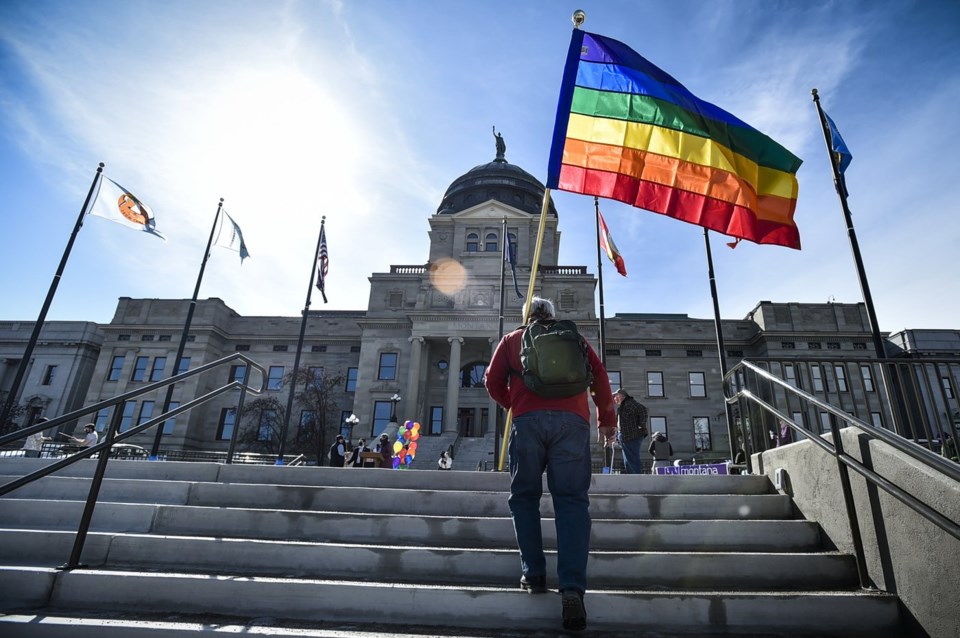HELENA, Mont. (AP) — A Montana law banning gender-affirming medical care for transgender minors will remain temporarily blocked, the state Supreme Court ruled Wednesday, after justices agreed with a lower court judge who found the law likely violates the state's constitutional right to privacy.
The case against the Montana law now goes to trial before District Court Judge Jason Marks in Missoula.
“I will never understand why my representatives are working to strip me of my rights and the rights of other transgender kids,” Phoebe Cross, a 17-year-old transgender boy and lead plaintiff, said in a statement. “Just living as a trans teenager is difficult enough, the last thing me and my peers need is to have our rights taken away.”
The attorney general's office said it looks forward to defending the law, with a spokesperson noting there are recent scientific and legal developments that fall in the state's favor. This comes as the British government on Wednesday banned puberty blockers for children with gender dysphoria, citing an unacceptable safety risk.
“In upholding the district court’s flawed decision to temporarily block a duly enacted law, the Supreme Court put the wellbeing of children -- who have yet to reach puberty -- at risk by allowing experimental treatments that could leave them to deal with serious and irreversible consequences for the rest of their lives to continue,” spokesperson Chase Scheuer said.
The U.S. Supreme Court earlier this month heard arguments over Tennessee’s ban on puberty blockers, hormones or surgery for transgender minors, with observers saying it appeared the justices were likely to uphold the ban. The Biden administration had sought to block similar bans that exist in more than half the states.
“Because Montana's constitutional protections are even stronger than their federal counterparts, transgender youth in Montana can sleep easier tonight knowing that they can continue to thrive for now, without this looming threat hanging over their heads,” said Kell Olsen, an attorney for Lambda Legal.
Legislative debate over Montana’s bill drew national attention in the spring of 2023 after Republicans punished Democratic Rep. Zooey Zephyr — the first transgender woman elected to the state’s Legislature — for admonishing lawmakers who supported the bill.
Marks blocked the law in late September 2023, just days before it was to take effect. He agreed with transgender youth, their families and health care providers that the law is likely unconstitutional and would harm the mental and physical health of minors with gender dysphoria, rather than protect them from experimental treatments, as supporters said it would.
The judge noted the same Republican-controlled Legislature passed a law saying patients, including minors, have a right to receive treatment with experimental drugs — as long as it's recommended by a health care provider and they give consent.
Marks said he could only conclude the Legislature's stated intent in passing the law was “disingenuous” and it seemed more likely its purpose is to “ban an outcome deemed undesirable by the Montana Legislature, veiled as protection for minors."
The law sought to prohibit the use of puberty blockers, cross-sex hormones and surgical treatments for gender dysphoria. However, cisgender minors would still be able to receive puberty blockers to treat early puberty or surgical procedures to treat intersex conditions, the plaintiffs argued.
Montana is one of at least 26 states that have passed bans on gender-affirming medical care for minors and most face lawsuits. Some bans have been temporarily blocked by courts, while others have been allowed to take effect. Fifteen states have enacted protections for gender-affirming medical care for minors.
In Montana’s case, transgender youth argued the law would ban them from continuing to receive gender-affirming medical care, violating their constitutional rights to equal protection, the right to seek health care and the right to dignity. The state Supreme Court upheld the injunction based on the right to privacy.
Two justices argued the court should have also clarified that discrimination on the basis of gender identity is a form of sex discrimination that is prohibited by the equal protection clause of the state constitution.
The parents of the plaintiffs argued the law would violate their constitutional right to make medical decisions for their children and two medical providers said it would prevent them from providing effective and necessary care to their patients.
“Montana’s ban is a direct assault on the freedom and well-being of transgender youth, their families, and their medical providers,” Malita Picasso, staff attorney for the American Civil Liberties Union, has said.
Treatments for gender dysphoria meet standards of care approved by major medical organizations including the American Medical Association and the American Academy of Pediatrics, the ACLU argued in its complaint.
One of the young plaintiffs was dismissed from the lawsuit in September 2024 after turning 18.
___
This story has been corrected to show that the U.S. Supreme Court heard arguments on the Tennessee ban earlier this month, not in June.
Amy Beth Hanson, The Associated Press
